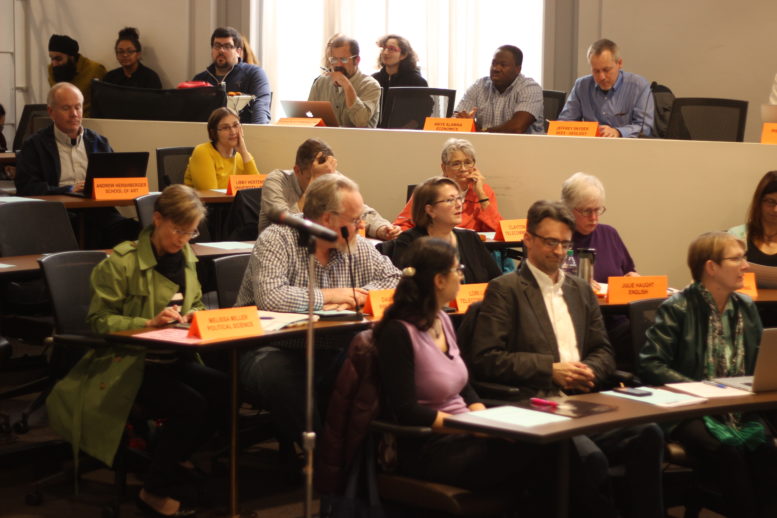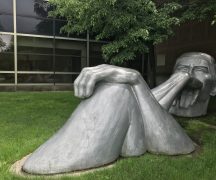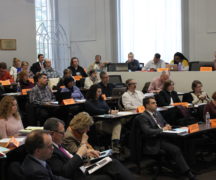By DAVID DUPONT
BG Independent News
No pickets showed up for Tuesday’s Faculty Senate meeting advocating for Bowling Green State University be designated a sanctuary campus.
A crowd was expected for the on-call session, which is on the calendar but seldom convened. Much to the dismay of a dozen or so students and faculty gathered for the proceedings, signs at the entryway to the assembly room advised that the seats were saved for senators.
Once roll was called Rachelle Kristof Hippler, who chairs the senate, invited them in to fill whatever empty seats were left.
Aside from reports from President Mary Ellen Mazey and Provost Rodney Rogers, the only item on the agenda was a resolution calling for BGSU to become a welcome campus.
The change in the wording from “sanctuary” to “welcome,” was intentional. Asked to explain the difference Christina Guenther, who introduced the resolution and had called for the session last time senate met, said that being a welcome campus better aligned with the Not In Our Town efforts.
The term also was “less loaded in terms of associations,” said the professor of German.
A bill, supported by U.S. Rep. Bob Latta (R-Bowling Green), has been introduced in the U.S. House calling for sanctions against sanctuary cities.
Regardless of the term used, the senate after no action on the issue the previous two times it met, passed the resolution 46-6 with one abstention.
The resolution was a softer version than the original petition.
This time, Mazey choose not to express her opposition, though after the meeting she said she was not ready to say she approved. The resolution contained issues, especially regarding campus police, that she would have to discuss with her cabinet, including the university counsel.
The resolution was amended before being passed.
A provision requiring Homeland Security, Border Patrol and Immigrant and Customs officials on campus for recruiting be dressed in plain clothes and be unarmed was stricken from the resolution.
Valeria Grinberg Pla, of Romance Languages, said that their presence “might very much frighten people who are risk.”
Allen Rogel, who teaches astronomy, questioned the rationale behind that part of the resolution. “Wouldn’t it much more comforting to know they are on campus, and not undercover?”
Michelle Heckman, director of the Math Emporium, said that provision discriminated against those agents by applying a standard to them not applied to others.
Derek Mason, of Sociology, said that criminal justice students had expressed concern about restricting recruiting by those agencies on campus.
Rogel later made the motion that excised that and made two wording changes. The words “unless compelled by federal warrant” were added to the section: “whereby Campus Police will not engage in helping the federal government with deportations or inquiring as to the immigration status of students.”
Mason questioned whether the provision was at odds with the laws that campus police are sworn to uphold.
Also, the call for the university to support legal challenges to the Jan. 27 executive order was broadened to cover “similar executive orders.” That came just as news was emerging of a new Trump Administration executive order on immigration that weakened some provisions of the first, but also called for greater enforcement.
As noted, by Jim Evans, of Geology, the resolution has no force of law. Ultimately policy is determined by the Board of Trustees, and he doubted federal authorities would pay attention to the resolution. “This is a statement of our sentiments.”
For student Hannah Modene the resolution was “very important.” She has friends who are very anxious about the situation, and it is good for them to know that the faculty supports them.





